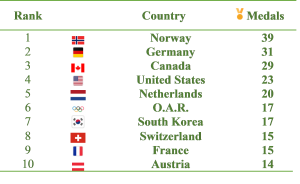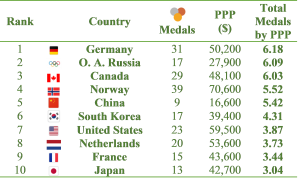Is ‘Neoliberal Feminist’ an Oxymoron?
More women are in positions of power than 50 years ago, but under a fairer system we would have made much more progress on gender equality.
When the 2018 Winter Olympics came to a close last month, the global consensus was that by the count of gold medals, Norway and Germany took the top two spots. But is a medal count alone the best way to measure the “winners” of these games? Or should we consider the larger structural and contextual conditions of each country when we measure who took home the most medals?
Given the inequality between nations, perhaps we should compare countries by their medal count measured against their GDP per capita, known as a resident’s purchasing power parity (PPP). Two years ago, I measured the rankings of the Rio Summer Games using this method. What do the numbers look like for Pyeongchang?
First, let’s look at the top ten countries, ranked below by gold medals.
Standings by Gold Medal Count

Source: NBC Olympics
When we consider the national wealth per person (PPP) alongside the number of gold medals awarded per country, what changes do we see? Below are the standings by gold medals, factoring in national PPP estimates. The results are determined by dividing each country’s gold medal count by its PPP rating, multiplied by 10,000 for ease of reading.
Standings by Gold Medal Count and PPP

Source: Country PPP (GDP per capita), CIA World Factbook
Germany and Canada beat out Norway when we factor in GDP per capita, and the bottom five countries look considerably different. We also see two new additions to the list — Ukraine and Belarus. Given the comparative resources of these winners, surely their success should be publicized.
What if a nation’s PPP is factored by total medal count? How would the standings change? Below, a chart of the total medal count from the top ten nations at the Games.
Standings by Total Medal Count

Source: NBC Olympics
We can compare that with the total medal count when GDP per capita is factored in.
Standings by Total Medal Count and PPP

Source: Country PPP (GDP per capita), CIA World Factbook
Factoring in GDP per capita with also impacts the overall standings. Germany now tops the list, followed by the Olympic Athletes from Russia. China enters the picture, coming in fifth. The U.S. and Netherlands fall back in the rankings, while tenth place goes to Japan. This more nuanced snapshot offers us new information. What captivating stories of determination could the media uncover if they reported on these results alongside the standard medal count?
Global inequality is vast, and the chasm has only continued to grow since the 2016 Summer Olympics. The 2017 Credit Suisse Wealth Databook found that less than one percent of the world’s population owns nearly half of its wealth; 8.6 percent of the world’s population owns 85.6 percent. Or, as Oxfam reports, 42 people are as rich as 3.7 billion of the world’s poorest. Meanwhile, more than 70 percent of the world’s millionaires live in North America or Europe. How do the realities behind those numbers affect athletes in other parts of the world as they seek to develop their talent?
Inequality, of course, is not the sole determinant of medals. Other factors can also affect Olympic results. Age, government aid, topography, and national dominance in a specific sport (for example, the way the Dutch have commanded speed skating) all influence Olympic wins. Additionally, foreign athletes living in the U.S. might compete under their national flag or switch allegiances and compete as U.S. citizens.
But national disparities in resource access continue to be a very real factor for some Olympians in their quest for the gold medal. Imperialism and colonization historically set countries on a curve of wealth-building, one that continues to this day. We might be tempted to think global inequalities are irrelevant during the Olympic Games, but the context still matters.
Let’s not look the other way when watching the Olympics. Our cultural responsibility is to examine the many reasons why some athletes find success while others miss out. The Olympics should be an opportunity to tell new stories, ones that move us past the traditional narratives that the gold medal count offers. We can acknowledge the vast disparities of global inequality, even while we praise the winners. Let’s give some recognition to those Olympians who overcame overwhelming odds, regardless of where they stood on the podium.
Notes:
Jenny McGill (PhD, King’s College London) works in higher education, currently serving as a dean at Indiana Wesleyan University. A Fulbright award recipient, she has worked as an international educator and intercultural consultant with clients and students from over sixty nations. Find her @drjennymcgill or at www.jennymcgill.com.
by Max Lawson
More women are in positions of power than 50 years ago, but under a fairer system we would have made much more progress on gender equality.
by Jenny Ricks
We will win economic justice when people power becomes stronger than those driving and benefitting from the status quo.
by Manuel Pérez-Rocha
U.S. and Canadian civil society groups are denouncing their own governments’ efforts, driven by the agribusiness industry, to repeal Mexico’s proposed ban on genetically modified corn.
Inequality.org
→ In Your Inbox
Get the indispensable guide to the latest on our unequal world, in your inbox every Wednesday.
You can unsubscribe any time. We do not sell or share your information with others.
Click to close
Inequality.org
→ In Your Inbox
Get the indispensable guide to the latest on our unequal world, in your inbox every Wednesday.
You can unsubscribe any time. We do not sell or share your information with others.
Click to close
Inequality.org
→ In Your Inbox
Get the indispensable guide to the latest on our unequal world, in your inbox every Wednesday.
You can unsubscribe any time. We do not sell or share your information with others.
Click to close
Inequality.org
→ In Your Inbox
Get the indispensable guide to the latest on our unequal world, in your inbox every Wednesday.
You can unsubscribe any time. We do not sell or share your information with others.
Click to close
Inequality.org
→ In Your Inbox
Get the indispensable guide to the latest on our unequal world, in your inbox every Wednesday.
You can unsubscribe any time. We do not sell or share your information with others.
Click to close